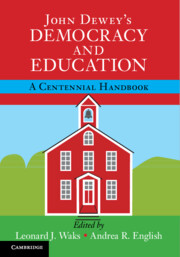Book contents
- John Dewey’s Democracy and Education
- John Dewey’s Democracy and Education
- Copyright page
- Contents
- Contributors
- Foreword
- Acknowledgments
- Note on Abbreviations
- Introduction
- Part I Companion Chapters
- Part II Democracy and Education in Context
- Introduction to Part II
- 27 The Dialogue of Death and Life: Education, Civilization, and Growth
- 28 John Dewey, a Modern Thinker: On Education (as Bildung and Erziehung) and Democracy (as a Political System and a Mode of Associated Living)1
- 29 John Dewey’s Refutation of Classical Educational Thinking
- 30 The Social as the “Inclusive Philosophic Idea” of Democracy and Education: Some Constructivists’ Reflections
- 31 John Dewey and the Analytic Paradigm in Philosophy of Education: Conceptual Analysis as a Social Aim?
- 32 Dewey, Care Ethics, and Education
- 33 Technologies for Democracy and Education in the Twenty-first Century
- 34 Inviting Dewey to an Online Forum: Using Technology to Deepen Student Understanding of Democracy and Education
- 35 John Dewey: Philosopher of Education for Our Time
- Index of Names
- References
31 - John Dewey and the Analytic Paradigm in Philosophy of Education: Conceptual Analysis as a Social Aim?
from Part II - Democracy and Education in Context
Published online by Cambridge University Press: 20 April 2017
- John Dewey’s Democracy and Education
- John Dewey’s Democracy and Education
- Copyright page
- Contents
- Contributors
- Foreword
- Acknowledgments
- Note on Abbreviations
- Introduction
- Part I Companion Chapters
- Part II Democracy and Education in Context
- Introduction to Part II
- 27 The Dialogue of Death and Life: Education, Civilization, and Growth
- 28 John Dewey, a Modern Thinker: On Education (as Bildung and Erziehung) and Democracy (as a Political System and a Mode of Associated Living)1
- 29 John Dewey’s Refutation of Classical Educational Thinking
- 30 The Social as the “Inclusive Philosophic Idea” of Democracy and Education: Some Constructivists’ Reflections
- 31 John Dewey and the Analytic Paradigm in Philosophy of Education: Conceptual Analysis as a Social Aim?
- 32 Dewey, Care Ethics, and Education
- 33 Technologies for Democracy and Education in the Twenty-first Century
- 34 Inviting Dewey to an Online Forum: Using Technology to Deepen Student Understanding of Democracy and Education
- 35 John Dewey: Philosopher of Education for Our Time
- Index of Names
- References
- Type
- Chapter
- Information
- John Dewey's Democracy and EducationA Centennial Handbook, pp. 304 - 313Publisher: Cambridge University PressPrint publication year: 2017
References
- 1
- Cited by



